Have you read about Yasmin Gasimova yet? A story about her not shaving was everywhere towards the end of last week.


Perhaps you saw it on MailOnline, with the headline: "Student who stopped shaving her legs at 11 says she has NO trouble attracting men... and has been inundated with offers from suitors since speaking about her body hair".
Or maybe you saw it on The Mirror's site, where it had the headline: "'Hairy student' Yasmin Gasimova says being unshaven all over doesn't stop men fancying her". Or perhaps you saw it at The Telegraph, or Metro, or Bustle, or any number of others – it's had thousands of social media shares.
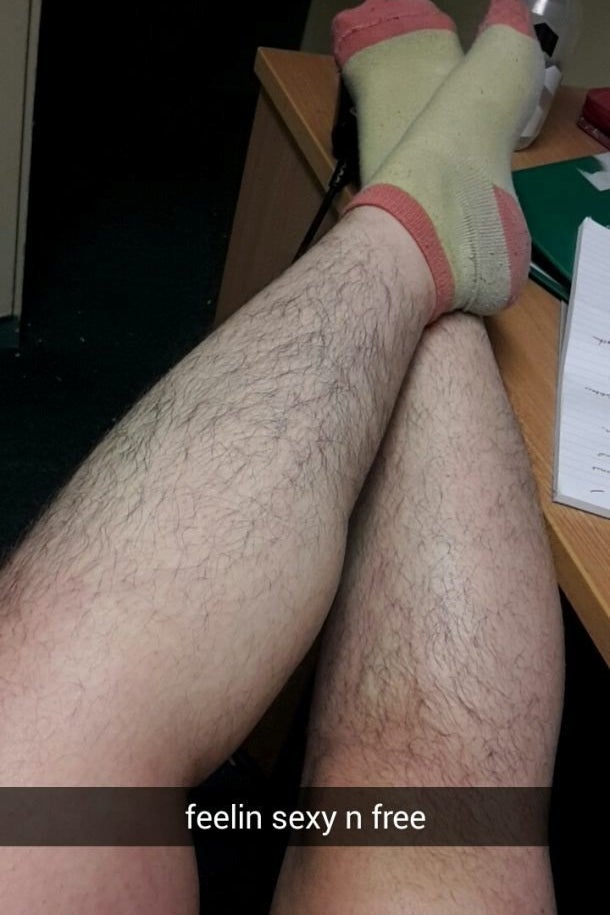
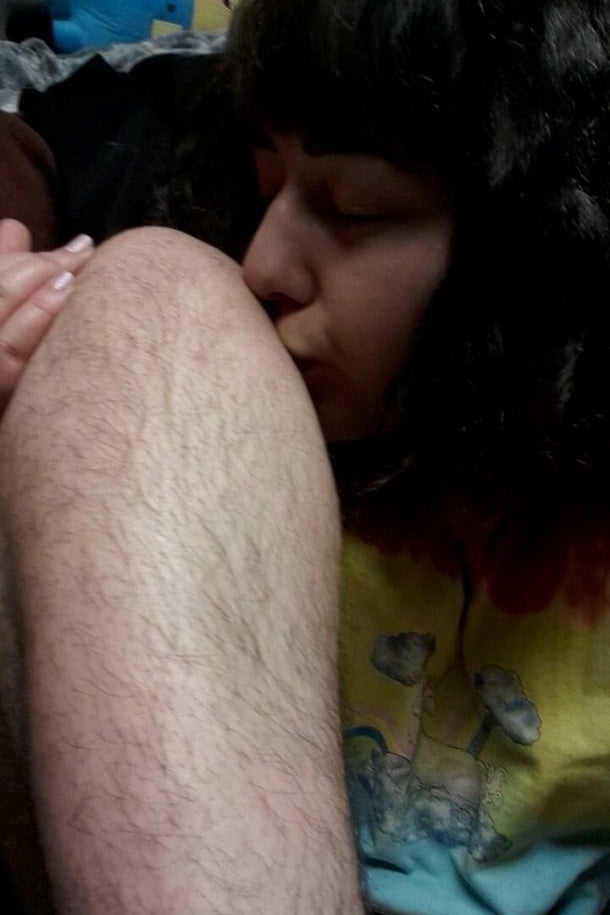
As a result of her story going viral, Gasimova apparently received hundreds of Facebook friend requests, as well as so many requests from journalists to talk to her that she's had to hire a press agency to deal with them. It's all a little distracting: She's currently a student in philosophy and computing at Liverpool University, and when BuzzFeed News speaks to her via email, she's about to take an exam the next day.
But what does the story of Yasmin Gasimova and her decision not to shave really tell us?
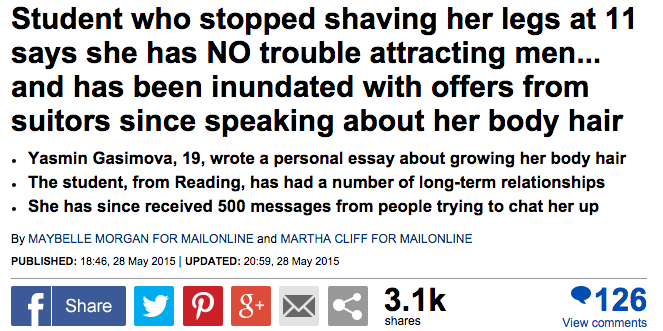
The first thing to understand is that it was never supposed to be a news story. It began with this article in the Liverpool Tab, which Gasimova intended as an opinion piece about beauty standards, albeit one based on personal experience. The first couple of lines read: "In a society where women are expected to shave, I'm not ashamed to admit I don't. I might trim my pubes if I'm going on holiday, but catch me on a normal day when my armpits are bushy and my legs furry, and you might be surprised."
Gasimova tells BuzzFeed News: "I wanted to raise awareness of social conditioning that influences people's tastes so that people that read my article can think for themselves about their own personal decisions with regard to body hair." The issue of gender double standards, she says, "meant something" to her because she had personally experienced the harm it can cause.
However, The Tab asked Gasimova to focus on her own experiences more than she'd initially intended; also, some of her wider points about the experience of shaving ended up being cut. The resulting article focused on Gasimova herself, with a structure revolving around "my lifestyle, choices and experiences … Many of my comments about gender norms [were] kept, but the resulting article focused more on me rather than the general idea of women having hair."
So Gasimova was suddenly the centre of the story. It changed the balance of the piece, but certainly didn't make it all that remarkable. As she says, "I know a good handful of women who don't shave." Indeed, she was still hoping it would reach a large number of readers: "I figured it would reach the national Tab because articles of a similar style to mine – clickbait title, bit controversial – often get put forward … and I was told by my editor that it was going to be a big story. ... I wanted as many people talking about this issue as possible."
It was shared more than a thousand times on The Tab's site. Gasimova got messages from friends around the country saying they'd read it, Vice asked to republish it, and she had her first request for interview from a magazine. She was happy with the attention at first: "The idea that I [was] getting people to talk about the social pressure on women to shave really excited me, because I felt like I was making a difference."
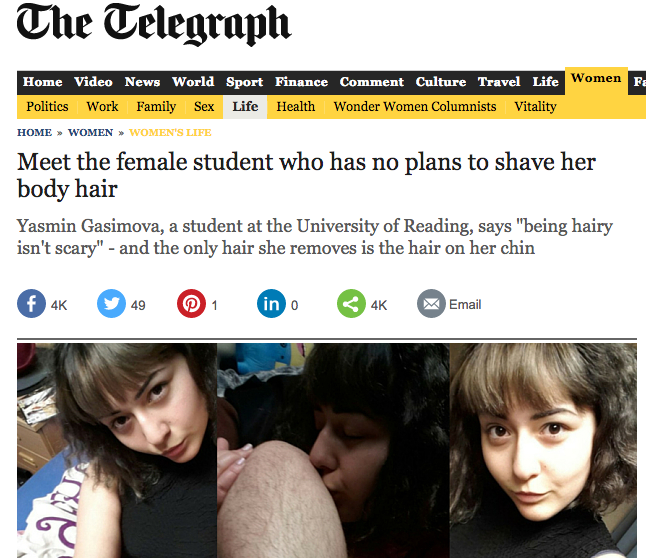
Her story then appeared on The Mirror's website. Gasimova was sitting an exam when it was published. He friends were excited about it, but "when I read it ... I felt a bit let down," she says. She was especially affronted by a poll at the bottom of the story that asked readers if they "supported Yasmin's right to shave". A majority of readers clicked "No, it's disgusting," but she just tried to ignore it. "It's always my choice," she says, "whether they think it is disgusting or not."
Since that post, The Mirror has also published this story about the number of Facebook friend requests Gasimova had received (based on her Twitter account), another news story about her, and pieces about Britain's "hairiest universities" and hairy celebrities that both reference her. In terms of traffic, she's done good business for the website.
That initial Mirror article was quickly followed by pieces on the Telegraph and Daily Mail sites, and Gasimova was contacted by press agencies who offered to handle interviews, story distribution, and photographs for her. She took one up on the offer due to the floods of requests she was receiving. Two days after her original article appeared on The Tab, she was on BBC Radio Birmingham, did a photo shoot before lunchtime, and had received over 600 Facebook friend requests, mostly from men. By now hers was a huge story, appearing all over the world in different languages.
Most of the personal messages she got were "supportive and lovely", she says, but the situation was getting "borderline unmanageable", even with the press agency's help. "I had an exam to study for, but this whole ordeal was very distracting and I was getting increasingly furious at the press coverage." She says she hasn't read some of the other stories: "Quite frankly they make me feel more ill than reading the hate comments at the bottom." She began to ask herself: "Why was I getting these … questions about my lifestyle, like I was something to be observed and commented on, rather than listened to?"

The mistake, Gasimova says, was adding pictures of herself to her original post: "It strengthened the idea that this was about me and not about women. ... I think this whole thing happened because of the way the trash media leans towards individuals' stories and how much the people that read them love to voice their opinions on other people's personal choices."
She adds: "For example, yesterday on Facebook, the fact an Australian news presenter's dress appeared to look like she was topless was trending. Literally just the fact that her dress made it look like she had nipples had people going crazy. The hype over this was just unbelievable and ridiculous in so many ways. It's just a dress.
"Even if her nipples were poking through, they're just nipples, which shouldn't make anyone feel uncomfortable. People seem to thrive on judging others, and women tend to receive the worst of it, as people insist on scrutinising and commenting on their appearance. I'm not of course denying that women are among the worst culprits of this, though, as both men and women have been brainwashed into a ridiculous set of standards."
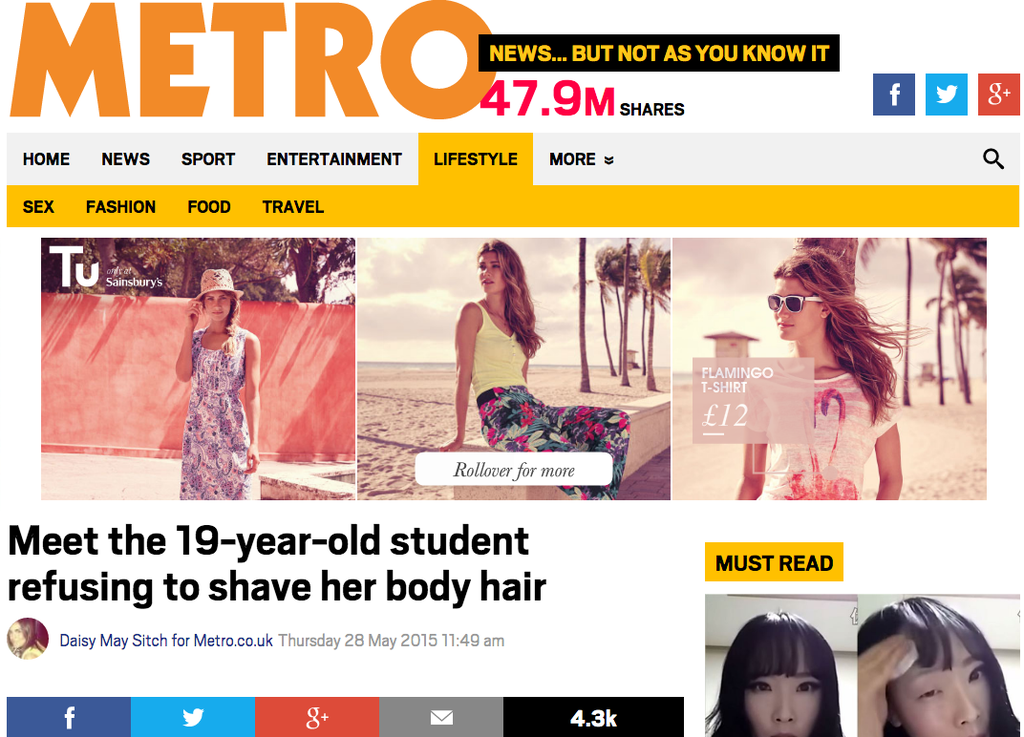
Gasimova stresses that she doesn't have a problem with "oddball news", nor with "tragedies that people can identify with" and "heartwarming personal stories".
What she has a problem with is news outlets "encouraging people to judge and harass others over differences" by "publishing stories about people who make controversial decisions".
"This is largely why I was furious over the coverage of my story," she says. "I never wanted it to be about me. I never thought it would be a good idea for the story to revolve around my personal lifestyle, decisions, and whether I can still get boyfriends. The more important issue at stake was encouraging people to question why they have these double standards – not invite people to talk about me and my body only."
She's frustrated that people like her become human case studies, while people affected by issues like poverty and international conflict are "only reported through a very limited and political perspective". "The Daily Mail in particular is guilty of this," she says. "While documenting the lives of the royal family in painful detail, it talks about refugees as if they are an inconvenience and their personal experiences do not matter."
Gasimova feels she's failed to communicate the original point of her article.
"The point was so lost that people accused me of being a hypocrite because I still plucked my eyebrows," she says, "or [said] that I must still be ashamed of my body because I still shave for one-night stands." She says she "won't be in any papers any more".
It's now four or so days since her story blew up. In internet terms, that's a long time. She's aware that everyone's moved on: "The fact [that] I was sensationalised into an odd freak made this into a short-running trend of discussion that would obviously very soon die out. Of course my entire point will be forgotten, although remembered by fellow feminists. But what was the point if I wasn't reaching out to people who didn't already identify as feminists?"
